News
Left behind: The forlorn fate of the disabled
Buses rarely stop for 27-year-old Colombo University graduate Nuwantha Gunasekara, who is visually impaired.
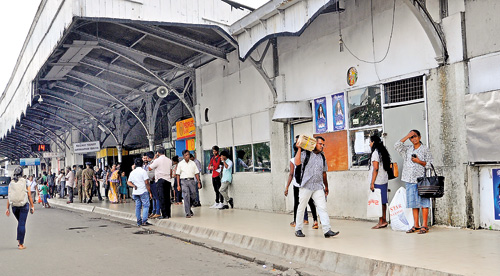
Fort Railway station: No access for the physically handicapped
“I take the bus from Balapitiya. There are dozens of times when I have heard conductors inviting others to get into the bus but they rarely direct me to the footboard. Sometimes they tell me to take another bus,” Mr. Gunasekera said.
Godage Chandradasa, 65, from Panadura, an amputee, said he had stopped travelling in trains because he finds it difficult to board them.
“It is not easy to climb train steps, which are like a ladder. A person with crutches or an artificial leg must struggle to get in. A person who in a wheelchair would need the help of another person to get into a train,” he said.
These are problems faced every day by members of Sri Lanka’s disabled population despite an Act protecting the rights of the disabled, regulations related to access for the disabled, and ratification of the United Nations Convention on the Rights of Persons with Disabilities.
There is even a National Secretariat for Persons with Disabilities under the Ministry of Social Services and a National Council for the Disabled, a steering committee on disability issues.
The problem, activists say, is mainly due to a lack of will to enforce the laws and regulations already in place.
The rights of the disabled in the country are protected by the Protection of the Rights of Persons with Disabilities Act No: 28 of 1996. Yet, little has been done to implement the regulations in the Act at public institutions, public transport centres and in public spaces, disability activist Ishan Jali noted.
Some measures such as the audible timer for pedestrian crossings have only been implemented in a few places, and overhead or underground crossings such as the crossing at Borella have no provisions for disabled access.
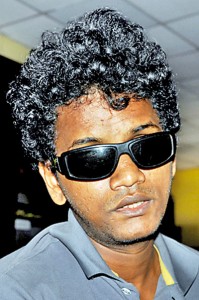
Nuwantha Gunasekara
“There is not enough political will to see the regulations implemented,” Mr. Jalil stated. There was much consultation with the disabled community when authorities prepared policies but the same enthusiasm was not carried over when implementing those same policies, he argued.
Mr. Jalil said the subject was not viewed seriously at higher levels of government and claimed some in policy-making see the exercise as merely “ticking boxes” to show the international community.
“They don’t get in the shoes of persons with disability to understand the issues faced on a daily basis. There is no empathy,” he said.
He acknowledged that the inclusion of disabled persons in the electoral system had gradually improved. From 2012, measures have been put in place to provide better physical access to voting centres for the disabled community.
In certain situations the ballot box was taken to the individual by officials of transport provided for disabled persons to exercise their franchise.
Voters who are blind can now ask a family member to accompany them to vote on their behalf or ask an elections official to cast a ballot for them.
Mr. Jalil urged the adoption of ballots printed in braille, which are in use in other countries and would offer privacy and dignity to blind voters.
“Accessibility is the life-force of day-to-day life. Everything revolves around the right to access, be it at hospitals, schools or recreational areas.
Without accessibility, all other rights become theoretical,” said Dr Ajith C.S. Perera, who has fought for decades for accessibility rights for the disabled community.
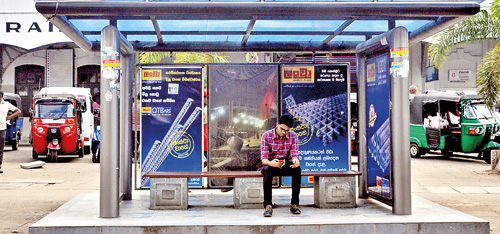
Bus stands too lack access for the physically handicapped
He noted that accessibility did not merely mean putting a ramp in place. The ramps only serve wheelchair users and there were many more areas such as parking, toilets, corridors, and even tables that needed to be specifically designed for those with disabilities. “There is a false belief that such measures will require a lot of expenditure, but in truth many of the measures are quite low-cost,” Mr. Perera insisted.
At government level, there is a comprehensive National Policy on Disability, adopted in 2003 as well as a National Action Plan for Disability, which was drafted in 2013. Nevertheless, there has been very little progress on physical access to public services and spaces for the disabled amid official apathy at the highest levels.
An official at the National Secretariat for Persons with Disabilities (NSPD), who wished to remain anonymous, told the Sunday Times the National Council for the Disabled had only met once this year after new members were appointed in May.
Members to the council are nominated by the Minister of Social Services and appointed by the President. Due to the current political turmoil, a new council has not been appointed. This has confounded the everyday operations of the NSPD.
Unable to authorise funding, the NSPD has even been unable to organise a national event on the International Day of Persons with Disabilities, which falls tomorrow, on December 3.
NSPD acting director P. Pathmakumara insists, however, that several regional events have been organised to commemorate the day.
Mr. Pathmakumara acknowledged the implantation of regulations on providing physical access for persons with disabilities is slow. He claimed the NSPD lacked the ability to enforce the regulations but said a survey of all public institutions was in hand to map compliance with the regulations. The report is to be prepared by the end of the first quarter of 2019.
There are 32,000 persons with disabilities currently registered with the NSPD. Mr. Pathmakumara claimed there were many more in waiting list to be registered and undergoing evaluation.
At present, a Rs. 3,000 allowance is paid monthly to the 32,000 registered persons. The secretariat also offers grants of Rs. 150,000-250,000 to disabled individuals to construct or install disabled access facilities in their homes.
| Platforms don’t match trains, concession passes ignored | |
Fundamental issues such as ensuring train platforms reach all carriage entrances, would do much to make life easier for people with disabilities to use public transport, the Sunday Times heard. 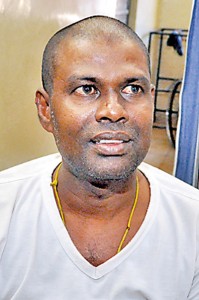 K.A.C. Nishantha There is no wheelchair access to the carriages, leaving those disabled at the mercy of fellow passengers to aid them in climbing onboard. Making matters worse, many carriage doors are narrow, hindering those with manoeouvrability problems. “There used to be designated seats in buses and train carriages but nowadays they are not left vacant or offered to disabled people who board,” Major (rtd) Sarath Dasanayake, the Chief Organiser of the Defence Services War Disabled Officers’ Association (DSWDOA), said. “We are very concerned: there should be better access to public services and better welfare facilities,” he said, adding that many buses did not stop to let a disabled person board. Further, the concession bus fare to which disabled veterans are entitled were not honoured by many private bus services. The Ranaviru Seva Authority is also concerned about the concession bus fares not being honoured. “As a nation, there seems to be degradation of values and lack of awareness about respecting persons with disabilities,” Ranaviru Seva Authority Director Major-General N.A.P.C. Napagoda said. 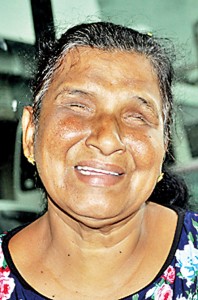 Rathnaseeli Abeysekara Rathnaseeli Abeysekara, 53, who is visually impaired, pointed out that platforms were too short for trains, which meant it was very difficult for disabled people to get on or off trains. “We can’t easily get onto a train. There have been incidents where sight-impaired people have fallen on to the tracks and been seriously injured,” Ms, Abeysekera said, adding that only two train stations in Colombo had white cane-friendly platforms. Ms. Abeysekera also complained of a lack of privacy when casting her vote as she has to get an election officer to vote for her or ask someone else to cast her vote. “Our voting system is not properly set up,” she said. “Our votes are known by everyone. Why can’t they use technology or offer a braille ballet paper?” K.A.C. Nishantha a resident of Pannipitiya who gets about with artificial legs after losing his own limbs in a train accident, said he faced difficulties when using washrooms at public places. “There are only a few places that have special washrooms to help the disabled,” he said. |
| SC notes a problem with enacting rights for disabled | |
| Help just comes in ‘bits and pieces here and there’, says petitioner The Supreme Court this week observed that although regulations governing the rights of disabled persons to access buildings were in place, there seemed to be a problem regarding lack of implementation of the regulations. 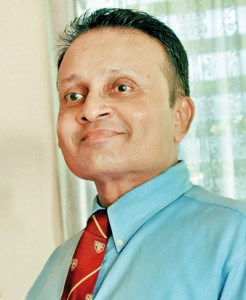 Dr. Ajith Perera The observation was made when a Fundamental Rights petition filed by rights activist Dr. Ajith C.S. Perera was taken up on Thursday before a three-judge bench comprising Supreme Court Justices Prasanna Jayawardena (presiding), Vijith Malalgoda and Murdu Fernando. Dr. Perera filed the petition alleging continued poor compliance of regulations governing accessibility in Gazette No: 1,4657/15 dated October 17, 2006. He appealed to the court to issue an order to strengthen an earlier order issued on April 27, 2011 in response to another petition – SC/FR/221/2009. That order made compliance with the accessibility regulations mandatory for gaining approval for building plans. Dr. Perera, who is a wheelchair user, represented himself and pointed out that Sri Lanka had enacted the Protection of the Rights of Persons with Disabilities Act No: 28 of 1996. He said the Ministry of Social Services had promulgated a comprehensive and detailed set of regulations through Gazette No: 1,4657/15 of October 17, 2006 governing accessibility for the disabled in the construction of new buildings. Over the following years, the ministry has thrice extended the deadline to comply with these regulations. In October 2014, it published a notice in newspapers stating that it would take legal action against offenders over non-compliance with these regulations. Despite “bits and pieces here and there,” since then, there has been no proper compliance and implementation of the regulations, Dr. Perera stressed. Through a motion, Dr. Perera has also presented a set of 10 remedial measures and has appealed for a fresh order from the Supreme Court to incorporate them in full to strengthen the earlier order dated April 27, 2011. He said a fresh court order would be a first step in helping to strengthen implementation measures. Senior State Counsel Rajitha Perera, appearing for the Attorney-General, stated that the current regulations were being reviewed and that the government had taken steps to amend the current Act. Justice Jayawardena queried whether Mr. Perera agreed that while regulations governing the rights of disabled persons to access buildings were in place there seemed to be a problem regarding lack of implementation. SSC Perera agreed with the court’s observation. Dr. Perera said the petitioner was free to make recommendations and the ministry could consider them when revising the Act and regulations. Dr. Perera, though, countered that the State was focusing on a bill to abolish the National Council for Persons with Disabilities and to appoint a disability rights authority as an independent body, and that all this would take time and hence new regulations would take even longer. What the country needs is implementation and enforcement,” he insisted. The court is deliberating the matter and has yet to set a date for the verdict. |

